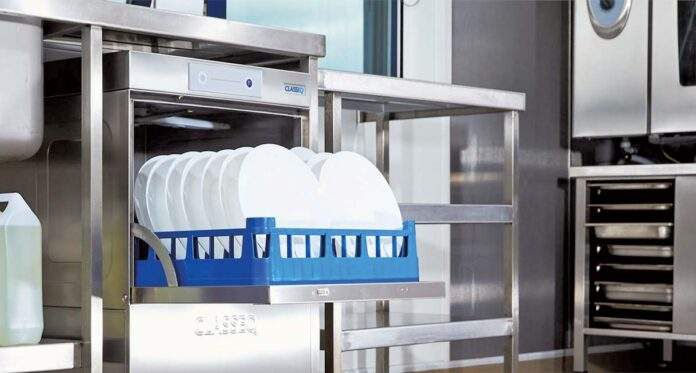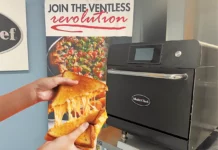
The return of in-house dining patrons is exciting for us all, but it also can be daunting as operators work on filling Back of the House (BOH) positions. The job market is competitive and turn over remains an issue.
Hit hard by the pandemic shutdowns, restaurants relied on delivery and to-go orders for most of their sales, which required minimal warewashing.
Now as customers return to in-house dining, operators need to increase and then retain their staff to perform the work necessary to keep their kitchens running properly. One critical process is warewashing.
For some, this has always been a manual process which is very labor intensive. For others, commercial dish machines are in use, but perhaps not performing at full efficiency.
What are the considerations for evaluating an automated warewashing program? If an operator is considering a dish machine program for the first time, it is important to start with a survey of their facility and address the following questions.
Is there space for a dish machine? Are there water and power sources? Is there drainage? If the answer is yes, then the next step is determining the size and type of machine.
What volume of wares needs to be washed and sanitized each day? What is the hot water temperature? What is the soil load? Even factors such as water hardness can impact performance.
We suggest starting with a professional service technician who can help operators analyze their situation and choose the best option. There are two main types of dish machines, high temp and low temp.
Both are effective but depending on the situation, one may be a better fit. High temp machines use heat to sanitize dishes, glassware, etc.
The water must reach 180 degrees F to meet regulations, which typically requires more energy. These models are more effective for removing heavy grease. Low temp machines require a chemical sanitizer and use more water, but less energy.
One of the elements of warewashing is understanding the impact that your tabletop items have on your dining guests’ experience. For instance, stemmed wine glasses need to be washed differently that your dishes to ensure they sparkle.
Spotty glassware is a big turn off. There are specialized glass washer machines that are often installed under a counter, although there are larger pass-through models as well. These are ideal for stemware, mugs, and other glasses. For plates and other wares, an upright model is more effective.
With the challenge of a reduced BOH staff, the washing of pots and pans is an issue. Pots and pans are often washed and sanitized in a 3-compartment sink due to their size, but if a restaurant uses a lot of this size cookware, a pot washer may be a good investment.
These have large openings and can save a lot of time compared to manual washing. If you have the space and other system requirements, a dish machine will never call in sick and will work non-stop until the job is done. This frees up your BOH staff for other work to ensure that that your guests are having a positive dining experience.
Energy and labor savings are key benefits to using dish machines. Today, many units are Energy Star Qualified which means the US Environmental Protection Agency and the US Department of Energy have determined that the unit is an energy-efficient product.
If you are looking to replace an older model with one of these new, more efficient models, you will save on your energy expenses. As far as labor savings, dish machines vary in throughput and efficiency.
An average comparison is a machine will wash a load in 90 seconds and that same load will take 20 minutes with manual washing, rinsing, and sanitizing. Another way to minimize costs are to ensure that your machine is working properly by having routine maintenance service calls.
As we work with our Imperial Dade customers, we have seen that hygiene and safety is a priority. We provide a full portfolio of warewashing chemicals that ensure effective cleaning.
Some operators are also committed to sustainability goals and wish to use “green” products whenever possible. We have options available with third-party certifications that verify the products have a lesser impact on the environment and are safer for human contact.
Training is very important, whether an operator uses a manual process or automated. A good warewashing training program must include product identification and proper use, the processes of preparing, sorting, and loading wares into a machine for optimal performance, the dispensing of chemicals, and any mandatory safety training.
Our Imperial Dade team is ready to offer guidance on how to create a warewashing program. Every day our technicians and sales consultants help operators install new warewashing systems or help improve the performance of existing systems.
The service techs will perform all that needs to be done to keep the system running smoothly as well as offer troubleshooting techniques for daily maintenance.
This includes checking the cleanliness of the machine and surrounding areas, levels of detergent concentration, water levels and temperatures, stocking of necessary supplies, and review any challenges or issues.
The results include labor savings, cleaner and more hygienic wares, and peace of mind that we are available 24/7 for emergency service to ensure operations run as expected.
Contact us for a free consultation at Imperial Dade website.























